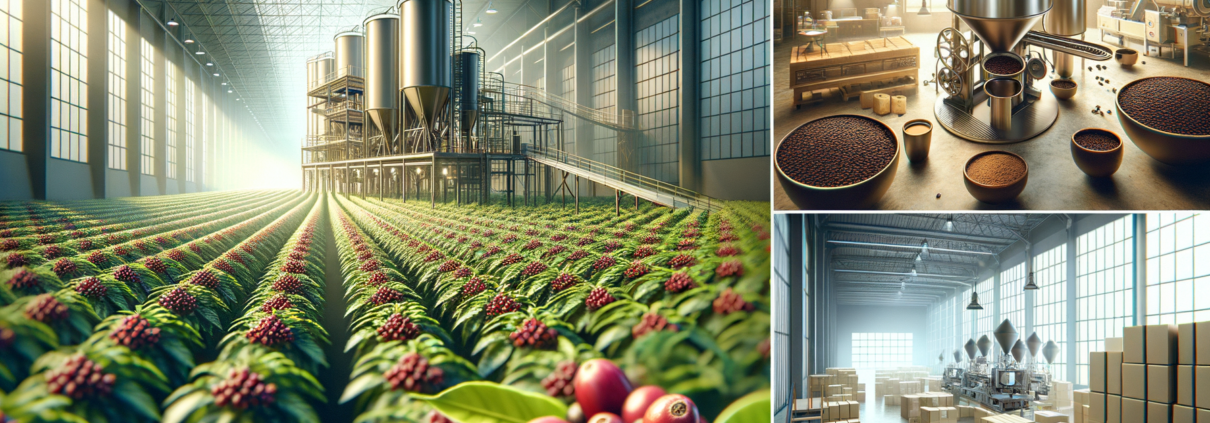Optimizing Coffee Production: The Role of Co-Packers
The Essential Role of Co-Packers in Enhancing Coffee Quality
Co-packers, or contract packagers, are pivotal in transforming coffee production into a more streamlined, efficient operation. By outsourcing coffee production to these specialized partners, businesses can leverage their comprehensive expertise and state-of-the-art facilities to ensure a consistent, high-quality coffee product. This strategic move not only enhances the efficiency of the production process but also allows brands to concentrate on their core competencies such as marketing, brand development, and customer engagement.
Bringing Expertise to Coffee Production
Co-packers come equipped with a deep understanding of the intricacies involved in coffee production. Their knowledge extends from selecting the right beans and roasting them to perfection, to the final packaging that preserves freshness and flavor. This level of expertise ensures that each batch meets the highest standards of quality, a crucial factor in building and maintaining consumer trust. By leveraging their specialized skills, coffee brands can streamline their production process, reducing the risk of quality issues and ensuring a consistently superior product.
Efficiency and Scalability in Operations
One of the key benefits of working with co-packers is the significant improvement in operational efficiency. Co-packers possess the machinery and technology required to carry out large-scale production runs, enabling coffee brands to scale their operations quickly in response to market demand. This scalability is especially beneficial for brands looking to expand their market reach without the heavy investment in facilities and equipment. Moreover, the operational efficiencies gained through outsourcing coffee production can lead to cost savings, which can then be redirected towards other areas such as product development and marketing strategies.
Quality Control and Regulatory Compliance
Maintaining high-quality standards and adherence to regulatory requirements is a critical aspect of coffee production. Co-packers are well-versed in navigating these challenges, often implementing rigorous quality control measures and staying updated with industry regulations. By doing so, they ensure that every product not only meets the brand’s high-quality standards but also complies with food safety laws and regulations. This attention to detail in quality control and regulatory compliance helps in safeguarding the brand’s reputation and minimizing the risk of costly recalls or legal issues.
In conclusion, outsourcing coffee production to co-packers offers a multitude of benefits, from enhancing production efficiency and product quality to ensuring compliance with industry standards. Their role in streamlining coffee production allows coffee brands to focus more on branding and marketing efforts, driving growth and success in a competitive market.
Cutting Costs and Improving Efficiency in Coffee Production
In today’s competitive coffee market, finding ways to cut costs and improve operational efficiency is paramount for any brand aiming to stay ahead. This is where the expertise of co-packers comes into play, fundamentally transforming the landscape of coffee production.
Enhancing Efficiency with Expert Co-Packers
Utilizing co-packers to streamline coffee production can significantly reduce overhead costs associated with maintaining manufacturing facilities and purchasing expensive equipment. These dedicated professionals are equipped with the necessary infrastructure and technological advancements to handle large-scale coffee production efficiently. By outsourcing production to these experts, brands can benefit from economies of scale, leading to lower production costs without compromising on the quality of their coffee.
Leveraging Specialized Skills for Superior Coffee Quality
Co-packers not only bring efficiency to the production process but also a level of expertise that can elevate the quality of the final product. Their years of experience in coffee manufacturing allow them to implement best practices throughout the production chain—from sourcing high-quality beans to perfecting roasting and grinding techniques. This specialized knowledge ensures each batch meets the high standards expected by consumers, contributing to a brand’s reputation for quality.
Reducing Costs Through Effective Resource Management
Another significant advantage of partnering with co-packers is their ability to manage resources more effectively than a brand might manage on its own. Through strategic purchasing agreements and streamlined logistics, co-packers can source raw materials at a lower cost and with greater efficiency. Additionally, their sophisticated inventory management systems help minimize waste, further reducing production expenses. These savings can then be passed down to the consumer or reinvested into other areas of the business, such as marketing and product development.
By outsourcing coffee production to co-packers, brands not only streamline their manufacturing process but also gain access to a wealth of knowledge and resources that can lead to better quality products, reduced costs, and improved overall efficiency. This strategic partnership allows brands to focus on their core competencies, like branding and customer engagement, while leaving the complexities of production to the experts.
The Technological Edge: How Co-Packers Innovate in Coffee Processing
Embracing state-of-the-art technology is a key factor in the ability of co-packers to streamline coffee production while maintaining, and often enhancing, quality. This technological edge allows for greater efficiency and innovation at every stage of the coffee processing journey.
Innovations in Roasting and Grinding
The heart of coffee processing lies in the roasting and grinding stages, where the unique flavors and aromas of coffee are developed. Advanced co-packers employ cutting-edge roasting equipment that allows for precise temperature and timing control, ensuring consistent roasting across batches. Modern grinding technologies, on the other hand, provide uniform grind sizes essential for optimal flavor extraction. These technological advancements enable co-packers to produce coffee that meets the specific taste profiles demanded by their clients.
Automated Packing for Peak Freshness
To preserve the freshness and flavor of coffee post-roasting, an efficient packing process is crucial. Co-packers leverage automated packaging systems equipped with nitrogen flushing and vacuum sealing to extend the shelf life of coffee products significantly. These systems ensure that coffee is packaged quickly after roasting, minimizing exposure to air and light, which can degrade quality. By incorporating such automated solutions, co-packers help brands ensure that their customers receive the freshest coffee possible.
Quality Control Through Technology
Beyond processing, technology plays a vital role in the rigorous quality control measures implemented by co-packers. From sophisticated optical sorting systems that remove defective beans to spectrometers that analyze the chemical composition of coffee for consistency, co-packers utilize a range of high-tech tools. These technologies enable them to meet and exceed the quality expectations set by their client brands, ensuring that only the best products make it to market.
The integration of these technological innovations by co-packers not only streamlines the coffee production process but also introduces a level of precision and consistency that is difficult to achieve manually. This technological edge allows coffee brands to focus on their core business areas, safe in the knowledge that their production needs are met efficiently and to the highest standards. By partnering with technologically advanced co-packers, coffee brands can optimize their production processes, resulting in superior products that stand out in a competitive market.
Building a Sustainable Coffee Brand with Co-Packer Expertise
In the quest to streamline coffee production and solidify a brand’s presence in the competitive market, leveraging the expertise of co-packers has emerged as a strategic move. These partnerships not only enhance operational efficiency but also play a pivotal role in building a sustainable coffee brand. Through their specialized services, co-packers bring a wealth of knowledge and state-of-the-art technology to the table, ensuring that every batch of coffee not only meets but exceeds industry standards.
Maximizing Efficiency in Coffee Production
The journey to streamline coffee production begins with an evaluation of the production process, identifying areas where efficiency can be optimized. Co-packers, with their comprehensive understanding of the coffee production lifecycle, offer invaluable insights into how to refine these processes. From sourcing high-quality beans to implementing eco-friendly packaging solutions, they ensure every step is executed with precision and care. This not only boosts production rates but also significantly reduces waste, contributing to a more sustainable production model.
Enhancing Quality with Expertise
At the core of building a successful coffee brand is the uncompromised quality of the product. Co-packers, equipped with advanced roasting and grinding technologies, play a crucial role in maintaining this quality. Their expertise extends beyond machinery; they possess a deep understanding of flavor profiles, roasting techniques, and blending methods that elevate the coffee experience for consumers. By entrusting this aspect of the business to co-packers, coffee brands can assure consistency in quality, fostering loyalty among customers and setting the stage for long-term success.
Streamlining Production for Market Expansion
One of the most significant advantages of partnering with co-packers is the ability to scale operations without compromising on quality or efficiency. As brands look to expand their market reach, co-packers offer the flexibility to increase production volumes swiftly. This scalability is essential for meeting rising demand, entering new markets, and launching innovative products. Moreover, co-packers can provide valuable advice on compliance with international standards and regulations, ensuring that coffee products are ready for global distribution.
In conclusion, co-packers are indispensable allies in the mission to streamline coffee production. Their expertise not only enhances the efficiency and sustainability of the production process but also ensures that the final product stands out in a crowded market. By collaborating closely with these specialists, coffee brands can focus on their growth strategies, confident in the knowledge that their production is in expert hands.
Navigating the Regulatory Landscape in Coffee Production with Co-Packers
In the intricate and ever-evolving world of coffee production, navigating regulatory requirements is a significant hurdle for many producers. This challenge, however, can be substantially mitigated with the expertise and assistance of co-packers. Their role is crucial in helping brands streamline coffee production processes, ensuring that all products meet the stringent standards set by food safety and regulatory bodies.
Expertise in Compliance and Quality Control
Co-packers bring a wealth of experience in compliance, equipped to handle the multifaceted regulations that govern the coffee industry. This expertise is invaluable for coffee brands aiming to streamline coffee production while maintaining the highest standards of quality. By leveraging co-packers’ deep understanding of regulatory demands, brands can focus more on innovation and less on the complexities of compliance. This collaboration not only enhances efficiency but also significantly reduces the risk of costly non-compliance issues.
Streamlining Operations with Certified Facilities
Utilizing co-packers means accessing facilities that are already certified and comply with industry standards, including HACCP, FDA, and GFSI benchmarks. This is a huge advantage for coffee brands, as it eliminates the need for extensive capital investment in infrastructure and the rigorous process of obtaining these certifications. Through co-packers, brands can streamline coffee production, gaining access to state-of-the-art equipment and technologies that ensure consistency and quality in every batch.
Adapting to Changing Regulations
The regulatory environment for coffee production is not static; it evolves in response to new research, technological advancements, and consumer expectations. Co-packers stay abreast of these changes, ensuring that coffee brands can swiftly adapt their production processes to comply with new requirements. This proactive approach in navigating the regulatory landscape not only helps in streamlining coffee production but also positions brands as responsible and trustworthy in the eyes of consumers.
In conclusion, the collaboration between coffee brands and co-packers plays a pivotal role in streamlining coffee production amid the complex regulatory environment. Co-packers’ specialized expertise in compliance, access to certified facilities, and ability to adapt to regulatory changes are crucial assets for coffee brands keen on optimizing their operations while upholding the highest standards of product quality and safety.



